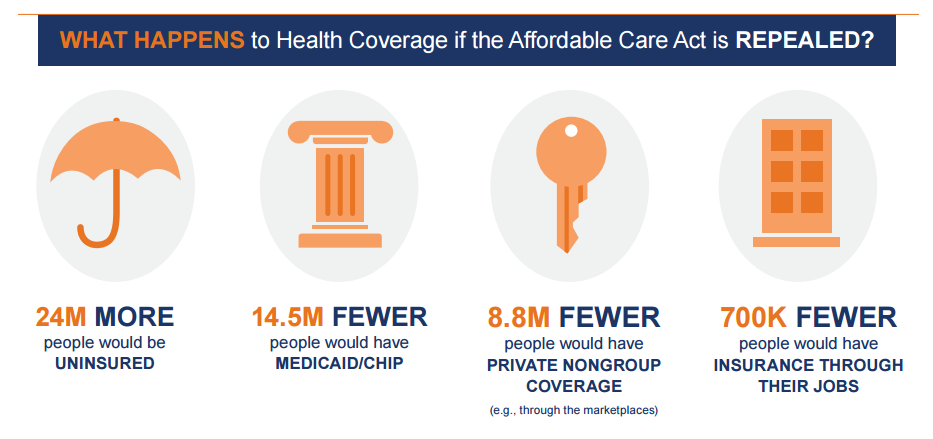What Repealing the Affordable Care Act Would Mean for America
A complete repeal of the Affordable Care Act may bring more problems for the healthcare industry and build a wall that would keep low-income individuals from receiving needed medical services.

- While the Patient Protection and Affordable Care Act was passed into law six years ago, there is still plenty of controversy that surrounds this landmark legislation. For instance, the Senate and House of Representatives passed a bill that would have essentially repealed the Affordable Care Act in January 2016, but it was vetoed by President Obama. Additionally, if the Republican Party takes over the next presidential cabinet, the prospect of a repeal is on the horizon.

As such, the Robert Wood Johnson Foundation and the Urban Institute released a brief that outlines what a repeal of the Affordable Care Act would mean for the rest of the country. The first large impact is that federal funding health coverage and access among the nonelderly would drop steeply.
Between 2017 and 2026, the federal funding for Medicaid expansion, premium subsidies, and other healthcare spending would be reduced by $927 billion. Essentially, the federal government’s responsibility to cover medical costs would decrease by 21.1 percent, the brief stated.
However, this would also mean that as many as 24 million people would lose their health insurance by 2021. The results also show that 81 percent of these individuals losing coverage would come from working families and two-thirds would have a high school education or less. Essentially, low-income families would, once again, lose healthcare access.
“Gains in health coverage under the ACA are caused mainly by new enrollment in Medicaid and the marketplaces, so these types of coverage would change the most if the ACA were repealed. We estimate that 52.6 million nonelderly people were enrolled in Medicaid or the Children’s Health Insurance Program in 2013. Under the ACA, Medicaid and CHIP enrollment will reach 69.3 million in 2021. If the ACA were repealed, 14.5 million fewer people would be enrolled,” the report from the Robert Wood Johnson Foundation stated.
Additionally, more than 9 million people who receive tax subsidies for private health plans on the health insurance exchange would lose that assistance. While it may seem like the nation would be able to reduce healthcare spending by dropping the funding for Medicaid expansion, this would actually leave the costs for uncompensated care to be covered by the states.
In fact, state spending for uncompensated medical services would rise by as much as $68.5 billion between the years 2017 and 2026. Any budget savings that states experienced under the Affordable Care Act would be out the window if the ACA is repealed.
Another important part of the latest attempt to repeal the Affordable Care Act is that there was no replacement plan in place to manage this movement toward healthcare reform. However, some representatives are bringing some proposals to undergo smaller changes to the Affordable Care Act.
For instance, Douglas Holtz-Eakin, President of the American Action Forum, spoke in front of the House of Representatives and offered his solutions on improving the healthcare law. First, greater equity can be given to consumers by ensuring they are provided the same 90-day grace period for health coverage despite not paying the monthly premiums regardless of whether they purchase health plans on or off the exchange.
Another suggestion made by Holtz-Eakin is to bring more verification for eligibility of certain government-sponsored health plan options. Currently, the ACA has a restriction on payers to ensure that premium costs based on age are capped at a three-to-one ratio.
This means that premiums for the elderly cannot be more than three times that for the young. This, however, gave payers a loophole to charge younger populations more in order to cover the costs of care among the elderly.
Holtz-Eakin suggests loosening this restriction in order to reduce consumer costs among younger generations. Additionally, the speech in front of the House called for the federal government to hold states more accountable for any terminated grants regarding state health insurance exchanges.
“We should focus on changes and improvements that provide consumers, providers, and taxpayers the most favorable outcomes possible. The evidence shows that there are clear failures in the law’s efforts to regulate the insurance market. Thus, changes that seek to roll back or correct these failed market reforms deserve bipartisan support,” he stated in front of the House.
“Consumers deserve to be freed from provisions that are unnecessarily inflating premium costs and creating inequities among health insurance purchasers. Taxpayers deserve transparency from their government and to have their money returned when improperly spent. And all parties need a clear set of rules, rather than vast amounts of regulation leading to a myriad of loopholes,” Holtz-Eakin concluded.
A complete repeal of the Affordable Care Act may bring more problems for the healthcare industry and, essentially, build a wall that would keep some low-income individuals from receiving needed medical services. However, implementing incremental changes to the Affordable Care Act may fill in the gaps that have caused issues for the health insurance industry and consumers at large.
Image Credits: Robert Wood Johnson Foundation
Dig Deeper:
Affordable Care Act Brought the Uninsured Rate to 9.1%
Court Sides with Republicans on Affordable Care Act Provision

